2015年,中国的广告开销高达750亿美元,是全球广告资金投入第二高的国家。那么既然市场规模如此之大,为什么在国际大赛中,中国的参赛作品却没有占到那么大的份额呢?
China spent almost US$75 billion on advertising in 2015, making it the market with the second highest advertising expenditure on earth. Why then does China’s participation at international shows remain so disproportionate to the size of the market?
泰国的亚太广告节创立于1998年,广泛被大众认为是亚洲最前沿的广告节之一。当SHP+向亚太广告节主席林俊明问到有关今年亚太广告节上,中国的广告作品的情况时,他原本热情洋溢的脸上立刻展现恼怒。“整体来看,中国的代表作品数量有所增加。但是鉴于中国的营销和传媒规模之大,所以其实作品所占的比重还是不大。”他说道,“中国有那么多的作品,但是入围广告节的却没那么多。比如说Fabulous 4奖,难道中国没有年轻导演吗?这绝不可能!”
Thailand’s ADFEST, founded in 1998, is widely regarded as one of Asia’s leading advertising festivals. When SHP+ asked ADFEST president Jimmy Lam about the China presence in Pattaya this year, his trademark enthusiasm quickly turned to exasperation. “The overall delegates are up. It’s growing but not in proportion to the marketing and communication population in China”, adding, “The entries are not in proportion to the volume of work being made. Take Fabulous 4; are there no young directors in China?! It’s not possible!”
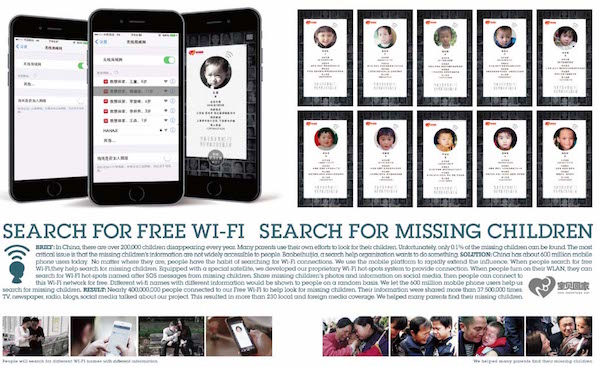 2015戛纳广告节金奖,《搜免费wifi,寻走失儿童》,北京TBWA|2015 Cannes Lion Gold, Search for Free Wifi, Search for Missing Children, by TBWA Beijing
2015戛纳广告节金奖,《搜免费wifi,寻走失儿童》,北京TBWA|2015 Cannes Lion Gold, Search for Free Wifi, Search for Missing Children, by TBWA Beijing
不仅如此,世界知名的戛纳国际创意节也是如此。广告节主席Terry Savage解释道,“(2015年)中国的参赛作品有330部,这是有史以来最多的一次……但是对比来看,美国的参赛作品却有2500部,所以中国其实还有很大的增长空间。”
The dearth extends to the world’s leading advertising show Cannes Lions. Chairman Terry Savage explains, “[In 2015] we had an all-time record 330 delegates from China… But if you look at that number by comparison to the 2500 delegates we get from the US, then there is obviously potential for growth.”
中国的得奖情况
China Prizes
Savage对近年来中国广告公司的作品还是很乐观的。在2015亚洲创意节(属于戛纳国际创意节的一部分,是亚洲另一知名广告节)期间,SHP+与他进行了交流,他指出,“10年前,中国几乎什么奖都没得过,但是现在,中国一年就能拿17个奖项,下一年又能拿23个奖项。而且还拿过两次全场大奖。他们已经步入了优秀创意水平的行列。”
Savage has seen a positive evolution for the work from Chinese agencies over the years. Speaking to SHP+ at Spikes Asia 2015 (a Lions event and another of Asia’s leading advertising festivals), he said, “10 years ago, China won virtually nothing, but now we’re seeing them winning 17 Lions one year, 23 Lions the next. They’ve won two Grand Prix. They’re past the tipping point in terms of the levels of creative excellence.”
2015年戛纳广告节金奖,《黑曼巴球场》,AKQA伦敦与AKQA上海|2015 Cannes Lion Gold, House of Mamba, by AKQA London/ AKQA Shanghai
虽然取得了这些成绩,但是相比之下,中国广告作品的整体水平还是不如日本、澳大利亚等亚太地区其他国家,也赶不上全球范围内其他地区。奥美中国COO Graham Fink曾是2015 戛纳国际创意节钛狮奖的评委,他表示,“(中国)的作品水平还不够。确实中国也在逐渐步入正轨,学得也很快,但还是有一段路要走。”
Despite the successes, the general quality of work from China is still below that of APAC heavy hitters like Japan or Australia and many other markets worldwide. Ogilvy China CCO Graham Fink, a Titanium Award judge at Cannes Lions 2015, summed up, “The [Chinese] work is not good enough. China is on it’s way, it’s learning really, really fast, but it’s got a way to go.”
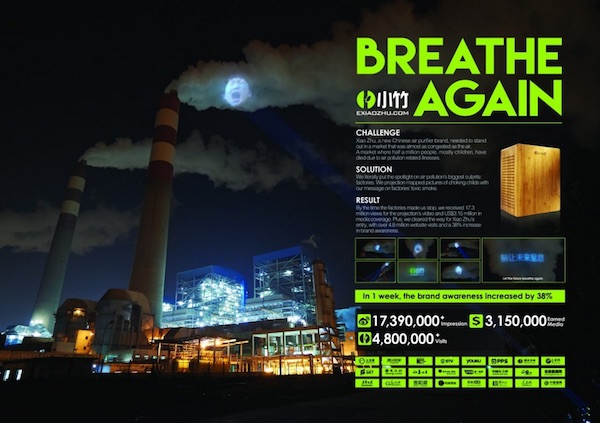 2015戛纳广告节金奖,《再次呼吸》,上海扬罗必凯|2015 Cannes Lion Gold, Breathe Again, by Y&R Shanghai
2015戛纳广告节金奖,《再次呼吸》,上海扬罗必凯|2015 Cannes Lion Gold, Breathe Again, by Y&R Shanghai
尤其是在中国的那些4A广告公司的作品,林俊明觉得尤为平庸,对此他把责任归结到比较谨慎的客户头上,“就国际客户而言,很少有人愿意冒险。但是在大赛中,平庸的作品根本没机会得奖。”的确如此,在中国这样一个规模巨大又难以预料的市场里,众多周知,各大品牌都很谨慎,不愿打破常规,在研究、定位人群和数据等方面都是保险起见。而一些较大的广告公司的广告宣传,注重的是效率而非概念,正如林俊明所说,这样的做法其实极大地阻碍了中国的发展机会,“所以不要去看比赛里有多少个作品,占多少比例,关键是如果作品没有概念、没有创意、没有战略可言,根本连入围都谈不上。”
Jimmy Lam is especially unimpressed by the output of the big China-based 4A agencies, placing particular blame on cautious clients, “Of the international clients, very few of them are willing to take a risk. In an award show, middle of the road work doesn’t stand a chance.” Indeed, with such a large and unpredictable market, brands are notoriously wary of campaigns that dare to venture outside the ordinary, preferring the security of research, focus groups and data. Bigger agencies build campaigns around effectiveness rather than ideas, something which, as Jimmy suggests, is critically hampering China’s chances, “It doesn’t matter about the numbers or the percentages. If there’s no idea, no creativity, no strategy, they don’t even get shortlisted.”
冷漠的独立广告公司
Indie Indifference
这样看来,我们似乎可以把希望寄托在一些比较灵活的独立广告机构和愿意冒险的客户身上。然而事实并非如此,这些独立的广告公司一般都会避开戛纳广告节、亚太广告节以及Spike(新加坡)等等这样大赛。
It would appear that the hope lies with the more nimble independent agencies and their typically more adventurous clients. However, they are generally shunning the likes of Cannes and big Asian shows such as ADFEST and Spikes (Singapore).
2015 Spikes Asia亚洲广告节全场大奖与金奖,《网游无罪,畅玩有理》,盛世长城大中华区|2015 Spikes Asia Grand Prix and Gold, Playing Can Not Be Bad, by Saatchi & Saatchi Greater China
最大的阻碍因素在于递交作品的高昂成本。想要参选戛纳广告节某个奖项类别,首先要缴纳520-1700美元(3400-11000元人民币)的参赛费用,而且跟其他的市场状况不同,中国的客户不太可能资助广告公司参赛。FCB上海执行创意总监Andy Chan解释说,“现在广告业的气候就是每一分钱都要花在刀刃上。很多时候,小公司的广告创意虽然很好,但是没钱参赛。一些本地的广告公司不会把戛纳广告节当作是自己的目标,他们看重的只是自身的业务。”而对于独立广告公司文明的执行创意总监骆耀明来说,他要在拿钱参赛和把钱奖励给自己的团队之间做出选择,“我更愿意把这份钱拿来组织公司度假、奖励员工还有给员工加薪上,这些人是实际帮你干活的人。如果他们想要拿奖的话,去别的地方好了。”
Most prohibitive are the costs associated with submitting work. Entering a single Cannes category costs between $520 (3400rmb) and $1700 (11,000rmb), and, unlike many of the winning entries from other markets, Chinese clients are unlikely to help fund entries. FCB Shanghai ECD Andy Chan elaborates, “The climate now is that every renminbi counts. In a lot of cases, smaller agencies with good ideas don’t have the money to enter. Local agencies don’t see Cannes as their destination; they care more about their business.” For Andrew Lok, ECD of independent agency Civilization, it is a choice between entering awards or rewarding his team, “I’d rather spend the money on company holidays, bonuses and raises for my staff, because those are the people that give you the work. If they want awards, they can go elsewhere”
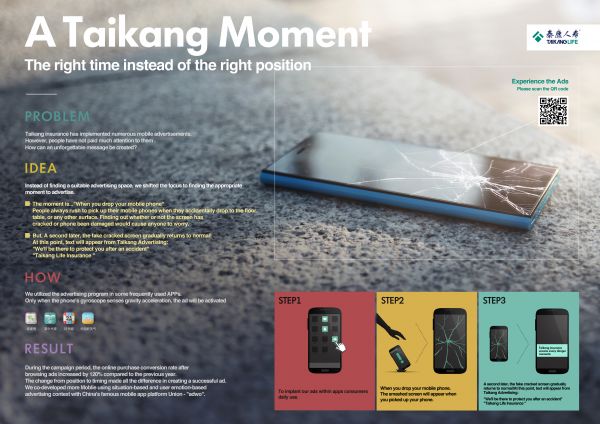 2015 亚太广告节金奖,《泰康瞬间》,北京杰尔鹏泰|2015 ADFEST Gold, A Taikang Moment, by Cheil Pengtai Beijing
2015 亚太广告节金奖,《泰康瞬间》,北京杰尔鹏泰|2015 ADFEST Gold, A Taikang Moment, by Cheil Pengtai Beijing
此外,中国的广告公司很多都是一种立足本土、与世隔绝的态度,所以这也是导致中国的参赛作品数量有限的原因。很多本土广告公司不在乎能不能得到国际认可。客户都是中国本地公司,所以他们只需要为中国市场提供服务就可以了。对此,上海独立广告公司W的创始人李三水解释说,“(中国的广告公司)根本不在乎亚太广告节或者其他什么广告节,他们只想着怎么多赚钱。即使赢了莲花奖,也不会真正给公司带来直接收益或者什么好处。”所以这样一种冷漠的态度也导致了一种恶性循环 — 中国作品在广告节上的份额少之又少,而且这些奖项看似也与中国毫无关系。
Chinese participation is also limited by an endemic insular attitude. Many local agencies are uninterested in winning international recognition. Their clients are China-based and they only seek to create work for the China market. Shanghai independent agency W founder Li Sanshui explainsexplains why other indies don’t share his enthusiasm, “[Chinese agencies] don’t care about ADFEST or other festivals, they just want to make more money. Winning a Lotus Award doesn’t really bring any direct profit or advantage to the company.” The indifference gives rise to a vicious cycle whereby minimal Chinese presence makes awards feel irrelevant to Chinese agencies.
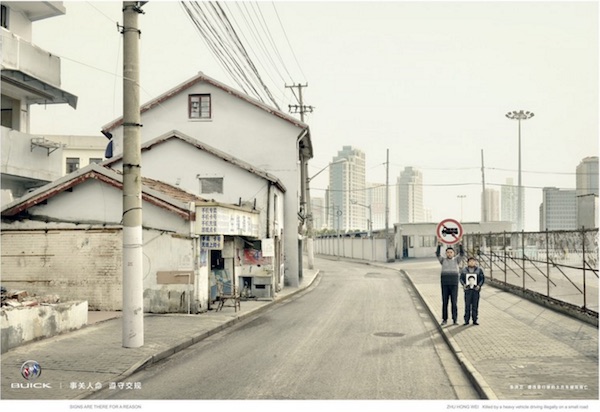 2015亚太广告节金奖,《事关人命,遵守交规》,上海睿狮|2015 ADFEST Gold, No Trucks Ahead, by Lowe China Shanghai
2015亚太广告节金奖,《事关人命,遵守交规》,上海睿狮|2015 ADFEST Gold, No Trucks Ahead, by Lowe China Shanghai
跟那些国际化的大公司不同,小型广告公司并没有由经验丰富的执行创意总监所组成的创意委员会,来决定哪些作品应该进一步润色一下去参赛。除了语言上的障碍,小公司也没有太多参赛经验,也不熟悉参赛过程,也不确定如何准备作品来最大化提升获奖机会。安索帕全球首席执行官林友琴是2015 戛纳国际创意节网络广告奖的评委会主席,她指出了中国参赛作品的短板,“当有3700个作品一起参赛时,关键就在于如何能够快速把想法清晰呈现出来,通过文化大环境、所表现出的问题和解决方案几个方面来实现。而多数的中国作品,都太注重概念的细节,而不是如何清晰地把它放在大的环境中来看。而如果直奔主题来呈现概念,就会忽视整个大格局。但是其实中国可以做的很好,帮助人们理解他们的作品,也可以通过一些解决方案受到激发。”
Unlike the big global agencies, smaller agencies do not have the benefit of the creative councils of experienced ECDs that decide which work should be polished and entered. On top of the language barrier, they are inexperienced with awards, unfamiliar with the entry process and unsure how to prepare work to give it the best chance of success. Jean Lin, Global CEO of ISOBAR and president of the judging committee for the Cyber Lions at Cannes Lions 2015, witnessed the shortcomings of Chinese submissions, “When you are competing against 3700 entries, what is crucial is how quickly the idea is made clear through providing the cultural context, the problem and the solution. Much of the work from China spends more time on the details of the ideas than clearly outlining the context. When you jump straight into the idea itself, it can lose sight of the bigger picture. China can do a lot better in helping people to understand and be inspired by the solutions happening here.”
2015戛纳广告节金奖,《英国等你来命名》,北京奥美|2015 Cannes Lion Gold, Great Names for Great Britain, by Ogilvy & Mather Beijing
即使一些中国的广告公司知道如何递交参赛作品,他们也很少有时间真正的付诸实践去参赛。佛海佛瑞上海创始人、董事长兼CEO Fred Raillard解释说,“中国的节奏太快了,人们没时间去润色作品。”他进一步指出,中国独特的数字格局意味着很多中国创作的作品无法直接归类到传统的比赛类别里,“我们甚至不知道我们的作品该参选哪一类。中国在社交媒体领域里很超前,但在传统媒体里却很落后。看看行业动态,百度、阿里、腾讯,我发现每一周都有不同的人改变着游戏规则。”
Even if China-based agencies understand how to make their submissions award-ready, they rarely have the time required to act upon it. Fred Raillard, founder, chairman and CEO of Fred & Farid Shanghai, explains. “It goes so fast in China that you don’t have time to polish your operation.” He adds that the unique nature of the digital landscape in China means much of the work they create does not fit neatly into the traditional categories, “We don’t even know into which category to enter [our work]. China is ahead on social media but behind on traditional media. Look at the dynamism… on Baidu, Alibaba and Tencent; every week I discover a completely new game-changer.”
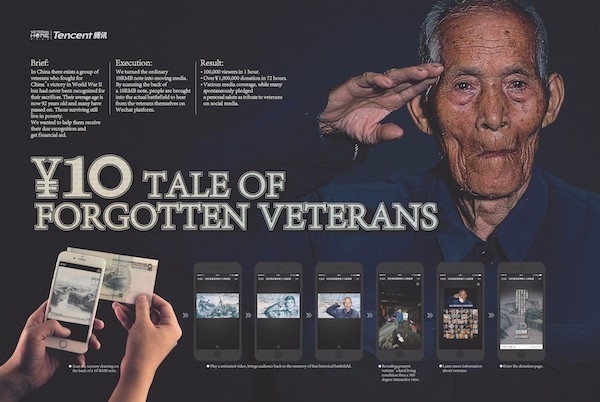 2015亚太广告节金奖,《10元背后看哭每个人的故事》,北京智威汤逊|2015 Adfest Gold, 10 Yuan Tale Of Forgotten Veterans by JWT Beijing
2015亚太广告节金奖,《10元背后看哭每个人的故事》,北京智威汤逊|2015 Adfest Gold, 10 Yuan Tale Of Forgotten Veterans by JWT Beijing
走进中国
Going Local
W广告公司创始人李三水在亚太广告节上慷慨陈词,呼吁中国的作品能多多参赛,“其实并不只是为了提升公司的名誉或是吸引更多的客户,而是在为整个行业做一件善事。所以我希望广告公司和制作公司能够肩负起责任……(参与广告节)可以极大推动广告产业的发展。我希望中国公司能够意识到这一点。”而林友琴概括地更精炼,“有得奖的欲望其实对所有创意人员来说都是好事,奖项可以推动行业的发展。”
W founder Li Sanshui, speaking at ADFEST, made an impassioned plea for increased Chinese participation, “It’s not only about the reputation of the company or attracting more clients, it’s about doing good for the industry. I hope the agencies and production houses take responsibility… [Participation] can bring a huge boost to the industry. I wish Chinese companies would realize that.” Jean Lin puts it even more succinctly, “Having the desire to win awards is a good thing for all creatives. Awards push the industry forward.”

要想在国际广告节上占有一席之地,中国行业人士需要齐心协力。“就制作人员而言,没有广告机构联盟,也没有制作行业协会可言。所以大家都是各做各的,各走各的路”,林俊明如是说。中国最大的行业协会,即中国广告协会,一直以来都是将精力放在国内。
To rally a significant presence at international festivals, China’s industry needs a unifying force. “For production people, there is no advertising agency association, no production guild. Everybody is operating separately, on their own”, says Jimmy Lam. However, the biggest industry association, the China Advertising Association (CAA) has been, and remains, heavily domestically focused.
2015戛纳广告节金奖,《百度筷搜》,北京百度在线网络技术|2015 Cannes Lion Gold, Baidu Kuaisou, by Baidu Online Network Technology (Beijing)
中国市场规模巨大,行业增长势头强劲,这就意味着中国要开始走出去,追随世界的步伐。现在中国大陆大概有十多个重要的奖项,其中有三个都是中国广告协会主办的,其中就包括中国国际广告节(始于1993年),还有金投赏(始于2003年)。此外,1997年林俊明和人联合创办的龙玺奖,也已成为最为人推崇的国内广告大赛之一。
The size of China’s market and growing strength of the industry means the focus is switching from China branching out, to the rest of the world looking in. There are now around a dozen significant award shows in the Mainland, three of which are operated by the CAA, including the China International Advertising Festival (CIAF) since 1993 and the ROI Awards since 2003. Jimmy Lam’s Longxi Awards has established itself as another of the most highly regarded domestic awards since he co-founded the event in 1997.
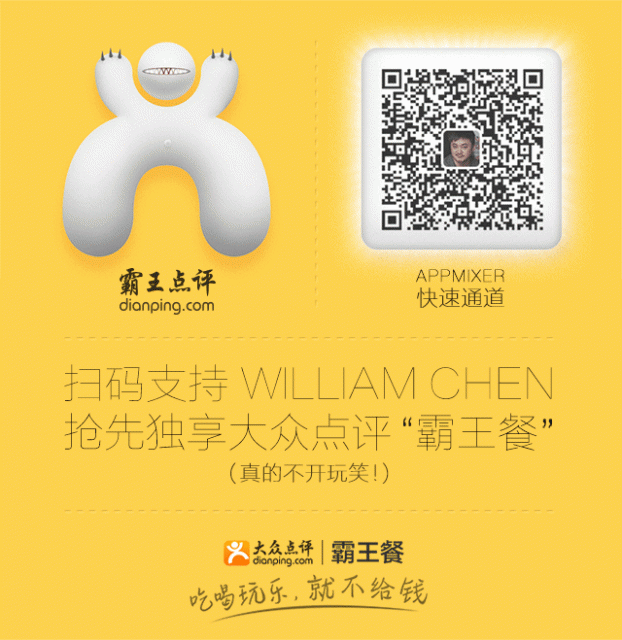 2015北京One Show全场大奖,霸王点评,W上海|2015 One Show Grand Prix, Dianping, by W shanghai
2015北京One Show全场大奖,霸王点评,W上海|2015 One Show Grand Prix, Dianping, by W shanghai
国际大奖赛也纷纷打入中国市场,而且他们会找本地的合作伙伴,从而更容易融入到本土市场中。美国One Show广告节自2001年就已进驻中国,由The One Club在大中华区成立的办公室运营。此外,还有美国的艾菲奖,与中国广告协会强强联手,于2003年开始在中国举办。英国D&AD创意奖和法国的Cristal奖,近年来都任命林俊明为荣誉主席,从而可以借助林俊明的广博人脉和业界声望,来打入中国市场。
International award shows, such as The One Show (USA) are entering the market, with a local office in greater China to ease the transition. The Effie Awards (USA) are working with the CAA, while both the British D&AD and the French Cristal Awards tapped into Jimmy Lam’s extensive connections and industry stature by appointing him as an honorary figurehead for their tentative recent forays into China.
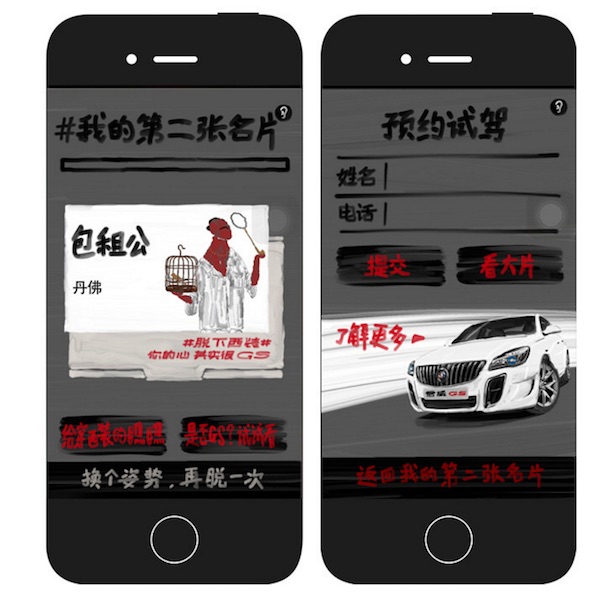 2015中国广告长城奖金奖,《第二张名片,脱下你的西装》,华扬联众上海公司|2015 Great Wall Award Gold, Take off Your Suit, by Hylink Shanghai
2015中国广告长城奖金奖,《第二张名片,脱下你的西装》,华扬联众上海公司|2015 Great Wall Award Gold, Take off Your Suit, by Hylink Shanghai
而戛纳创意节之前在中国锁举办的亚洲实效营销奖(北京)以及Digital Asia(上海),可谓是以失败而告终。由于这些活动具有区域性,所以都是以英语为语言,但是实际上绝大多数参与人员还有赞助商都是中国人,所以Terry Savage将其称为“一场精神分裂的活动”。他确切指明,戛纳创意节肯定会再次回归中国,但是也强调,手法上一定要有所改变,“把这样的活动引入中国,如果仍然把它做成一场西方的活动,保持西方的价值,不去考虑中国市场的独特性和文化,根本没什么意义。中国市场很独特……和东南亚市场的运作非常不同……所以还是要反映出中国市场的状况。如果真的要做一场广告节,那就要必须得用中文。”
Lions came unstuck on its previous efforts in China, the Asia Marketing Effectiveness Awards (Beijing) and Digital Asia (Shanghai). The shows were held in English because they were regional, but the vast majority of delegates and sponsors were Chinese, leading to what Terry Savage describes as a “schizophrenic event”. He confirms that Lions will return to the China market but emphasizes that a change of approach is needed, “It’s no good coming in and being a big western festival with western values in a market with a very unique approach and culture. China is it’s own market… It operates very differently from the South East Asian markets…You’ve got to reflect what is happening there. If you’re going to do something, it has to be done in Chinese.”
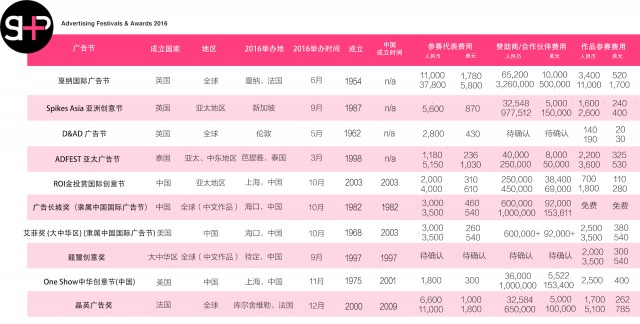
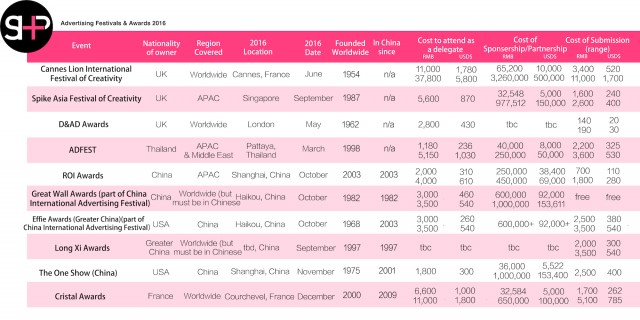
中国/国际广告节名单|Chinese / International advertising Festival and Awards




 BAM Music Library Brings Edgy, Indie Sounds to Chinese Creatives
BAM Music Library Brings Edgy, Indie Sounds to Chinese Creatives
